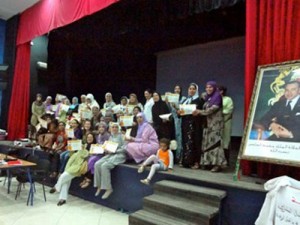Healthcare resources are limited in Eve Brecker’s small Moroccan town, so she made it her mission to teach women to take better care of themselves.
Earlier this month she certified 71 women in Figuig, Morocco, in health education and teaching techniques that will help them convey what they learned to their community as part of a Peace Corps project focused on creating a peer educator network and decreasing dependence on local health services for survival.
“Medical resources include only two rotating doctors who are responsible for the care of the town’s 12,000 residents,” she said. “Preventable disease is rampant in Figuig. However, self-treatment is rarely successful as those who are ill do not know the proper means to care for themselves.”
Brecker, 26, who graduated from Hampton RoadsAcademy and lived in Williamsburg for several years, has been an advocate for healthcare and awareness since high school. She worked with nonprofit organizations while earning a degree in international affairs from James Madison University, but knew that to truly pursue her passions in international development she’d need to live abroad and experience what she was seeking to change.
After working at the International Youth Foundation in Baltimore for three years she decided to apply to the Peace Corps and committed to 27 months abroad. She left for Morocco in March 2012 to work as a community development volunteer.
She learned the remote location of Figuig, the town she was sent to, meant delivery of products and services was very limited. She said no specialist for eye care, dental care, diabetes or extensive lab work is available in the town, which means those in need of care must travel six hours to the nearest city or hope the problem resolves itself. The limited scope and availability of care often causes trivial problems to evolve into larger health issues.
The scarcity of healthcare resources in the small town inspired Brecker to take action. She developed a two-day two weekend women’s health conference to educate women on the basics of hygiene, menstruation, diabetes, breast cancer, maternal care, diet and exercise, and more. In addition to teaching women to care for themselves, Brecker said the goal was to empower women to teach their peers to educate others.
“We hope this ‘peer health educator’ network will further expand the reach of our health lessons to the greater Figuig area and that, combined, these outcomes will result in a stronger, self-sustaining, and healthier Figuig.”
Establishing peer health educators networks in towns like Figuig is an essential part of building capacity to hold other health education events in the community, according to a press release on Brecker’s project. Currently, 236 volunteers in Morocco work in youth development, English education and health.
Brecker said she worked with three Moroccan colleagues on the conference. Participants were self- and peer-identified. A follow-up meeting will be conducted this fall to learn how the women applied what they learned.








